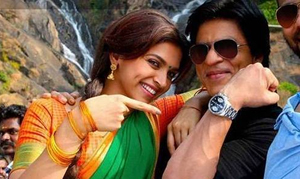 Mumbai, Jun 10: Actress Deepika Padukone, who has teamed up with superstar Shah Rukh Khan yet again after a gap of six years for action-comedy 'Chennai Express', says she trusts him very much personally as well as professionally.
Mumbai, Jun 10: Actress Deepika Padukone, who has teamed up with superstar Shah Rukh Khan yet again after a gap of six years for action-comedy 'Chennai Express', says she trusts him very much personally as well as professionally.
The model-turned-actress made her debut opposite Khan in 'Om Shanti Om' in 2007 and was directed by Farah Khan. The film saw her in a double role.
"It was glad to be working with him again. He has become my very good friend today. He is someone I trust personally and professionally. I am sure he will always be there for me whenever I need him," Deepika said.
'Chennai Express' directed by Rohit Shetty and produced by Gauri Khan under her production banner Red Chillies Entertainment will release on August 8.
"It was lot of fun working on the film. It was a great experience. Rohit is known for making comedy films and this film as well has turned out to be very entertaining. It is very different from what he has done. I am quite excited about its release," Deepika said.
The film is the story about a man's journey from Mumbai to Rameswaram and what happens during the journey.
The 27-year-old would be seen next in Sanjay Leela Bhansali's much talked about film 'Ram Leela', which is said to be an adaptation of Shakespeare's epic love story Romeo and Juliet, set in violent times.
"Every director is a task master as they all churn out the best from us. They want to make a good film," Deepika said on Bhansali's hard ways on the film sets.
Deepika has been paired opposite Ranveer Singh for the first time in this film and gossip mills are already abuzz with their close equation.
About his co-star Ranveer, she said, "He is a fabulous actor, he is very talented. It was a great experience working with him. He is a great co-star, a great person and nothing else.
"People create hype when the film is about to release. People should understand it is all about on-screen chemistry. I don't feel the need to go and clarify things to people."





Comments
Add new comment